- Home
- Joseph Conrad
Romance Page 10
Romance Read online
Page 10
Meantime I let the days slip by idly, only wondering how I could manage to remain in Havana and breathe the air of the same island with the girl who had delivered me. Perhaps some day we might meet—who knows? I was not afraid of that Irishman.
It never occurred to me to bother about the course we were taking, till one day we sighted the Cuban coast, and I heard Lumsden and Mercer pronounce the name of Rio Medio. The two ridiculous old chaps talked of Mexican privateers, which seemed to rendezvous off that place. They pointed out to me the headland near the bay. There was no sign of privateer or pirate, as far as the eye could reach. In the course of beating up to windward we closed in with the coast, and then the wind fell.
I remained motionless against the rail for half the night, looking at the land. Not a single light was visible. A wistful, dreamy longing, a quiet longing pervaded me, as though I had been drugged. I dreamed, as young men dream, of a girl's face. She was sleeping there within this dim vision of land. Perhaps this was as near as I should ever be able to approach her. I felt a sorrow without much suffering. A great stillness reigned around the ship, over the whole earth. At last I went below and fell asleep.
I was awakened by the idea that I had heard an extraordinary row—shouting and stamping. But there was a dead silence, to which I was listening with all my ears. Suddenly there was a little pop, as if someone had spat rather vigorously; then a succession of shouts, then another little pop, and more shouts, and the stamping overhead. A woman began to shriek on the other side of the bulkhead, then another woman somewhere else, then the little girl. I hurried on deck, but it was some minutes before I could make things fit together. I saw Major Cowper on the poop; he was brandishing a little pistol and apostrophizing Lumsden, who was waving ineffectual arms towards the sky; and there was a great deal of shouting, forward and overhead. Cowper rushed at me, and explained that something was an abominable scandal, and that there were women on board. He waved his pistol towards the side; I noticed that the butt was inlaid with mother-of-pearl Lumsden rushed at him and clawed at his clothes, imploring him not to be rash.
We were so close in with the coast that the surf along the shore gleamed and sparkled in full view.
Someone shouted aloft, "Look out! They are firing again."
Then only I noticed, a quarter of a mile astern and between the land and us, a little schooner, rather low in the water, curtseying under a cloud of white canvas—a wonderful thing to look at. It was as if I had never seen anything so instinct with life and the joy of it. A snowy streak spattered away from her bows at each plunge. She came at a great speed, and a row of faces looking our way became plain, like a beady decoration above her bulwarks. She swerved a little out of her course, and a sort of mushroom of smoke grew out of her side; there was a little gleam of smouldering light hidden in its heart. The spitting bang followed again, and something skipped along the wave-tops beside us, raising little pillars of spray that drifted away on the wind. The schooner came back on her course, heading straight for us; a shout like groaned applause went up from on board us. Lumsden hid his face in his hands.
I could hear little Mercer shrieking out orders forwards. We were shortening sail. The schooner, luffing a little, ranged abreast. A hail like a metal blare came out of her.
"If you donn'd heef-to we seenk you! We seenk you! By God!"
Major Cowper was using abominable language beside me. Suddenly he began to call out to someone:
"Go down... go down, I say."
A woman's face disappeared into the hood of the companion like a rabbit's tail into its burrow. There was a great volley of cracks from the loose sails, and the ship came to. At the same time the schooner, now on our beam and stripped of her light kites, put in stays and remained on the other tack, with her foresheet to windward.
Major Cowper said it was a scandal. The country was going to the dogs because merchantmen were not compelled by law to carry guns. He spluttered into my ears that there wasn't so much as a twopenny signal mortar on board, and no more powder than enough to load one of his duelling pistols. He was going to write to the Horse Guards.
A blue-and-white ensign fluttered up to the main gaff of the schooner; a boat dropped into the water. It all went breathlessly—I hadn't time to think. I saw old Cowper run to the side and aim his pistol overboard; there was an ineffectual click; he made a gesture of disgust, and tossed it on deck. His head hung dejectedly down upon his chest.
Lumsden said, "Thank God, oh, thank God!" and the old man turned on him like a snarling dog.
"You infernal coward," he said. "Haven't you got a spark of courage?"
A moment after, our decks were invaded by men, brown and ragged, leaping down from the bulwarks one after the other.
They had come out at break of day (we must have been observed the evening before), a big schooner—full of as ill-favoured, ragged rascals as the most vivid imagination could conceive. Of course, there had been no resistance on our part. We were outsailed, and at the first ferocious hail the halyards had been let go by the run, and all our crew had bolted aloft. A few bronzed bandits posted abreast of each mast kept them there by the menace of bell-mouthed blunderbusses pointed upwards. Lumsden and Mercer had been each tied flat down to a spare spar. They presented an appearance too ridiculous to awaken genuine compassion. Major Cowper was made to sit on a hen-coop, and a bearded pirate, with a red handkerchief tied round his head and a cutlass in his hand, stood guard over him. The major looked angry and crestfallen. The rest of that infamous crew, without losing a moment, rushed into the cuddy to loot the cabins for wearing apparel, jewellery, and money. They squabbled amongst themselves, throwing the things on deck into a great heap of booty.
The schooner flying the Mexican flag remained hove to abeam. But in the man in command of the boarding party I recognized Tomas Castro!
He was a pirate. My surmises were correct. He looked the part to the life, in a plumed hat, cloaked to the chin, and standing apart in a saturnine dignity.
"Are you going to have us all murdered, Castro?" I asked, with indignation. To my surprise he did not seem to recognize me; indeed, he pretended not to see me at all. I might have been thin air for any sign he gave of being aware of my presence; but, turning his back on me, he addressed himself to the ignobly captive Lumsden, telling him that he, Castro, was the commander of that Mexican schooner, and menacing him with dreadful threats of vengeance for what he called the resistance we had offered to a privateer of the Republic. I suppose he was pleased to qualify with the name of armed resistance the miserable little pop of the major's pocket pistol. To punish that audacity he announced that no private property would be respected.
"You shall have to give up all the money on board," he yelled at the wretched man lying there like a sheep ready for slaughter. The other could only gasp and blink. Castro's ferocity was so remarkable that for a moment it struck me as put on. There was no necessity for it. We were meek and silent enough, only poor Major Cowper muttered:
"My wife and child. . . ."
The ragged brown men were pouring on deck from below; their arms full of bundles. Half a dozen of them started to pull off the main hatch tarpaulin. Up aloft the crew looked down with scared eyes. I began to say excitedly, in my indignation, almost into his very ear:
"I know you, Tomas Castro—I know you—Tomas Castro."
Even then he seemed not to hear; but at last he looked into my face balefully, as if he wished to convey the plague to me.
"Hold your tongue," he said very quickly in Spanish. "This is folly!" His little hawk's beak of a nose nestled in his moustache. He waved his arm and declared forcibly, "I don't know you. I am Nicola el Demonio, the Mexican."
Poor old Cowper groaned. The reputation of Nicola el Demonio, if rumours were to be trusted, was a horrible thing for a man with women depending on him.
Five or six of these bandits were standing about Lumsden, the major, and myself, fingering the locks of their guns. Poor old Cowper, breaking away from his
guard, was raging up and down the poop; and the big pirate kept him off the companion truculently. The major wanted to get below; the little girl was screaming in the cuddy, and we could hear her very plainly. It was rather horrible. Castro had gone forward into the crowd of scoundrels round the hatchway. It was only then that I realized that Major Cowper was in a state of delirious apprehension and fury; I seemed to remember at last that for a long time he had been groaning somewhere near me. He kept on saying:
"Oh, for God's sake—for God's sake—my poor wife."
I understood that he must have been asking me to do something.
It came as a shock to me. I had a vague sensation of his fears. Up till then I hadn't realized that any one could be much interested in Mrs. Cowper.
He caught hold of my arm, as if he wanted support, and stuttered:
"Couldn't you—couldn't you speak to———" He nodded in the direction of Tomas Castro, who was bent and shouting down the hatch. "Try to———-" the old man gasped. "Didn't you hear the child scream?" His face was pallid and wrinkled, like a piece of crumpled paper; his mouth was drawn on one side, and his lips quivered one against the other.
I went to Castro and caught him by the arm. He spun round and smiled discreetly.
"We shall be using force upon you directly. Pray resist, Señor; but not too much. What? His wife? Tell that stupid Inglez with whispers that she is safe." He whispered with an air of profound intelligence, "We shall be ready to go as soon as these foul swine have finished their stealing. I cannot stop them," he added.
I could not pause to think what he might mean. The child's shrieks resounding louder and louder, I ran below. There were a couple of men in the cabin with the women. Mrs. Cowper was lying back upon a sofa, her face very white and drawn, her eyes wide open. Her useless hands twitched at her dress; otherwise she was absolutely motionless, like a frozen woman. The black nurse was panting convulsively in a corner—a palpitating bundle of orange and purple and white clothes. The child was rushing round and round, shrieking. The two men did nothing at all. One of them kept saying in Spanish:
"But—we only want your rings. But—we only want your rings."
The other made feeble efforts to catch the child as it rushed past him. He wanted its earrings—they were contraband of war, I suppose.
Mrs. Cowper was petrified with terror. Explaining the desires of the two men was like shouting things into the ear of a very deaf woman. She kept on saying:
"Will they go away then? Will they go away then?" All the while she was drawing the rings off her thin fingers, and handing them to me. I gave them to the ruffians whose presence seemed to terrify her out of her senses. I had no option. I could do nothing else. Then I asked her whether she wished me to remain with her and the child. She said:
"Yes. No. Go away. Yes. No—let me think."
Finally it came into my head that in the captain's cabin she would be able to talk to her husband through the deck ventilator, and, after a time, the idea filtered through to her brain. She could hardly walk at all. The child and the nurse ran in front of us, and, practically, I carried her there in my arms. Once in the stateroom she struggled loose from me, and, rushing in, slammed the door violently in my face. She seemed to hate me.
CHAPTER SIX
I went on deck again. On the poop about twenty men had surrounded Major Cowper; his white head was being jerked backwards and forwards above their bending backs; they had got his old uniform coat off, and were fighting for the buttons. I had just time to shout to him, "Your wife's down there, she's all right!" when very suddenly I became aware that Tomas Castro was swearing horribly at these thieves. He drove them away, and we were left quite alone on the poop, I holding the major's coat over my arm. Major Çowper stooped down to call through the skylight. I could hear faint answers coming up to him.
Meantime, some of the rascals left on board the schooner had filled on her in a light wind, and, sailing round our stern, had brought their vessel alongside. Ropes were thrown on board and we lay close together, but the schooner with her dirty decks looked to me, now, very sinister and very sordid.
Then I remembered Castro's extraordinary words; they suggested infinite possibilities of a disastrous nature, I could not tell just what. The explanation seemed to be struggling to bring itself to light, like a name that one has had for hours on the tip of a tongue without being able to formulate it. Major Cowper rose stiffly, and limped to my side. He looked at me askance, then shifted his eyes away. Afterwards, he took his coat from my arm. I tried to help him, but he refused my aid, and jerked himself painfully into it. It was too tight for him. Suddenly, he said:
"You seem to be deuced intimate with that man—deuced intimate."
His tone caused me more misgiving than I should have thought possible. He took a turn on the deserted deck; went to the skylight; called down, "All well, still?" waited, listening with his head on one side, and then came back to me.
"You drop into the ship," he said, "out of the clouds. Out of the clouds, I say. You tell us some sort of cock-and-bull story. I say it looks deuced suspicious." He took another turn and came back. "My wife says that you took her rings and—and—gave them to———"
He had an ashamed air. It came into my head that that hateful woman had been egging him on to this through the skylight, instead of saying her prayers.
"Your wife!" I said. "Why, she might have been murdered—if I hadn't made her give them up. I believe I saved her life."
He said suddenly, "Tut, tut!" and shrugged his shoulders. He hung his head for a minute, then he added, "Mind, I don't say—I don't say that it mayn't be as you say. You're a very nice young fellow.... But what I say is—I am a public man—you ought to clear yourself." He was beginning to recover his military bearing.
"Oh! don't be absurd," I said.
One of the Spaniards came up to me and whispered, "You must come now. We are going to cast off." At the same time Tomas Castro prowled to the other side of the ship, within five yards of us. I called out, "Tomas Castro! Tomas Castro! I will not go with you." The man beside me said, "Come, señor! Vamos!"
Suddenly Castro, stretching his arm out at me, cried, "Come, hombres. This is the caballero; seize him." And to me in his broken English he shouted, "You may resist, if you like."
This was what I meant to do with all my might. The ragged crowd surrounded me; they chattered like monkeys. One man irritated me beyond conception. He looked like an inn-keeper in knee-breeches, had a broken nose that pointed to the left, and a double chin. More of them came running up every minute. I made a sort of blind rush at the fellow with the broken nose; my elbow caught him on the soft folds of flesh and he skipped backwards; the rest scattered in all directions, and then stood at a distance, chattering and waving their hands. And beyond them I saw old Cowper gesticulating approval. The man with the double chin drew a knife from his sleeve, crouched instantly, and sprang at me. I hadn't fought anybody since I had been at school; raising my fists was like trying a dubious experiment in an emergency. I caught him rather hard on the end of his broken nose; I felt the contact on my right, and a small pain in my left hand. His arms went up to the sky; his face, too. But I had started forward to meet him, and half a dozen of them flung their arms round me from behind.
I seemed to have an exaggerated clearness of vision; I saw each brown dirty paw reach out to clutch some part of me. I was not angry any more; it wasn't any good being angry, but I made a fight for it. There were dozens of them; they clutched my wrists, my elbows, and in between my wrists and my elbows, and my shoulders. One pair of arms was round my neck, another round my waist, and they kept on trying to catch my legs with ropes. We seemed to stagger all over the deck; I expect they got in each other's way; they would have made a better job of it if they hadn't been such a multitude. I must then have got a crack on the head, for everything grew dark; the night seemed to fall on us, as we fought.
Afterwards I found myself lying gasping on my back on the deck of the sc
hooner; four or five men were holding me down. Castro was putting a pistol into his belt. He stamped his foot violently, and then went and shouted in Spanish:
"Come you all on board. You have done mischief enough, fools of Lugarenos. Now we go."
I saw, as in a dream of stress and violence, some men making ready to cast off the schooner, and then, in a supreme effort, an effort of lusty youth and strength, which I remember to this day, I scattered men like chaff, and stood free.
For the fraction of a second I stood, ready to fall myself, and looking at prostrate men. It was a flash of vision, and then I made a bolt for the rail. I clambered furiously; I saw the deck of the old barque; I had just one exulting sight of it, and then Major Cowper uprose before my eyes and knocked me back on board the schooner, tumbling after me himself.
Twenty men flung themselves upon my body. I made no movement. The end had come. I hadn't the strength to shake off a fly, my heart was bursting my ribs. I lay on my back and managed to say, "Give me air." I thought I should die.
Castro, draped in his cloak, stood over me, but Major Cowper fell on his knees near my head, almost sobbing: "My papers! My papers! I tell you I shall starve. Make them give me back my papers. They ain't any use to them—my pension—mortgages—not worth a penny piece to you."
He crouched over my face, and the Spaniards stood around, wondering. He begged me to intercede, to save him those papers of the greatest importance.
Castro preserved his attitude of a conspirator. I was touched by the major's distress, and at last I condescended to address Castro on his behalf, though it cost me an effort, for I was angry, indignant, and humiliated.

 Heart of Darkness
Heart of Darkness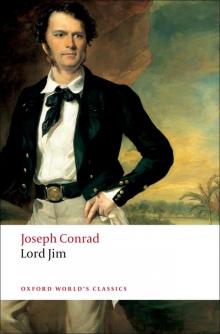 Lord Jim
Lord Jim The Nigger of the Narcissus (Echo Library)
The Nigger of the Narcissus (Echo Library) Victory (Dover Thrift Editions)
Victory (Dover Thrift Editions) Secret Agent
Secret Agent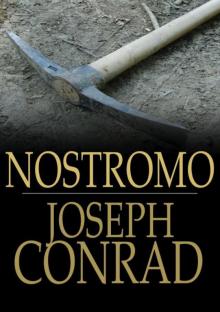 Nostromo
Nostromo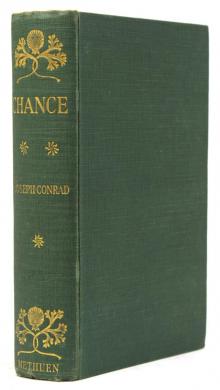 Chance: A Tale in Two Parts
Chance: A Tale in Two Parts Youth
Youth Almayer's Folly
Almayer's Folly The Heart of Darkness and the Secret Sharer
The Heart of Darkness and the Secret Sharer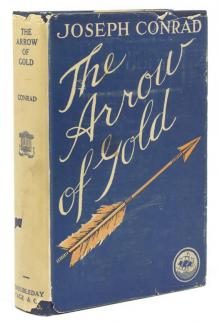 The Arrow of Gold: A Story Between Two Notes
The Arrow of Gold: A Story Between Two Notes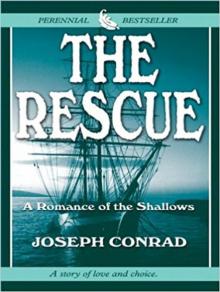 The Rescue: A Romance of the Shallows
The Rescue: A Romance of the Shallows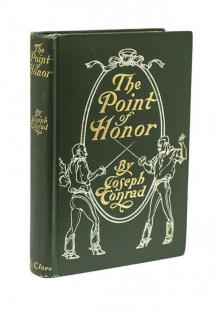 The Point Of Honor: A Military Tale
The Point Of Honor: A Military Tale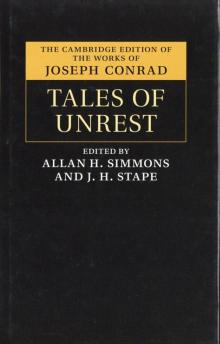 Tales of Unrest
Tales of Unrest Under Western Eyes
Under Western Eyes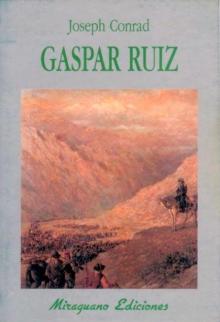 Gaspar Ruiz
Gaspar Ruiz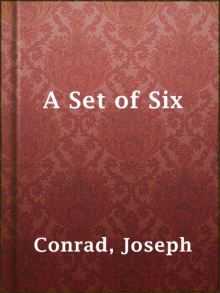 A Set of Six
A Set of Six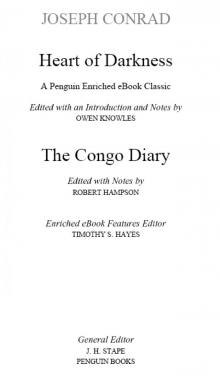 Heart of Darkness and the Congo Diary (Penguin Classics)
Heart of Darkness and the Congo Diary (Penguin Classics) Heart of Darkness and Selected Short Fiction
Heart of Darkness and Selected Short Fiction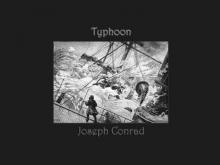 Typhoon
Typhoon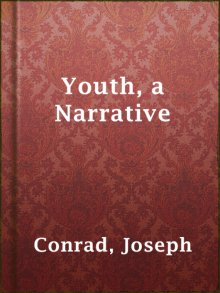 Youth, a Narrative
Youth, a Narrative Tomorrow
Tomorrow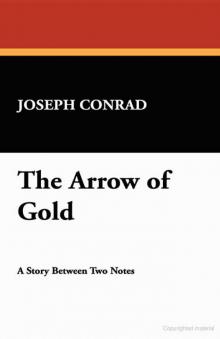 The Arrow of Gold
The Arrow of Gold The Shadow Line: A Confession
The Shadow Line: A Confession The Rescue
The Rescue Victory (Echo Library)
Victory (Echo Library) The Brute
The Brute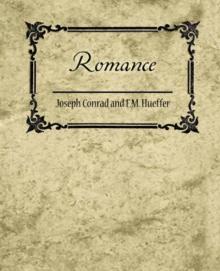 Romance
Romance A Personal Record
A Personal Record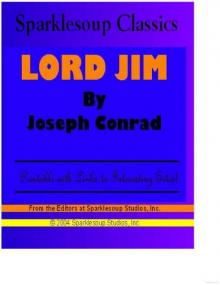 Lord Jim: A Tale
Lord Jim: A Tale Heart of Darkness and Selected Short Fiction (Barnes & Noble Classics Series)
Heart of Darkness and Selected Short Fiction (Barnes & Noble Classics Series) Within the Tides
Within the Tides The Secret Sharer and Other Stories
The Secret Sharer and Other Stories Falk
Falk Heart of Darkness and The Secret Sharer
Heart of Darkness and The Secret Sharer Chance
Chance An Anarchist
An Anarchist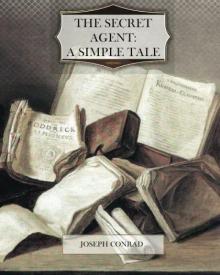 The Secret Agent: A Simple Tale
The Secret Agent: A Simple Tale The Secret Agent
The Secret Agent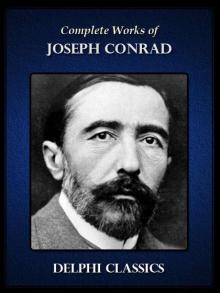 Complete Works of Joseph Conrad (Illustrated)
Complete Works of Joseph Conrad (Illustrated)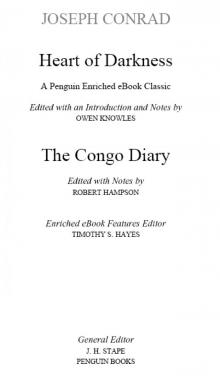 Heart of Darkness and the Congo Diary
Heart of Darkness and the Congo Diary Notes on Life & Letters
Notes on Life & Letters Typhoon (Single Story)
Typhoon (Single Story)